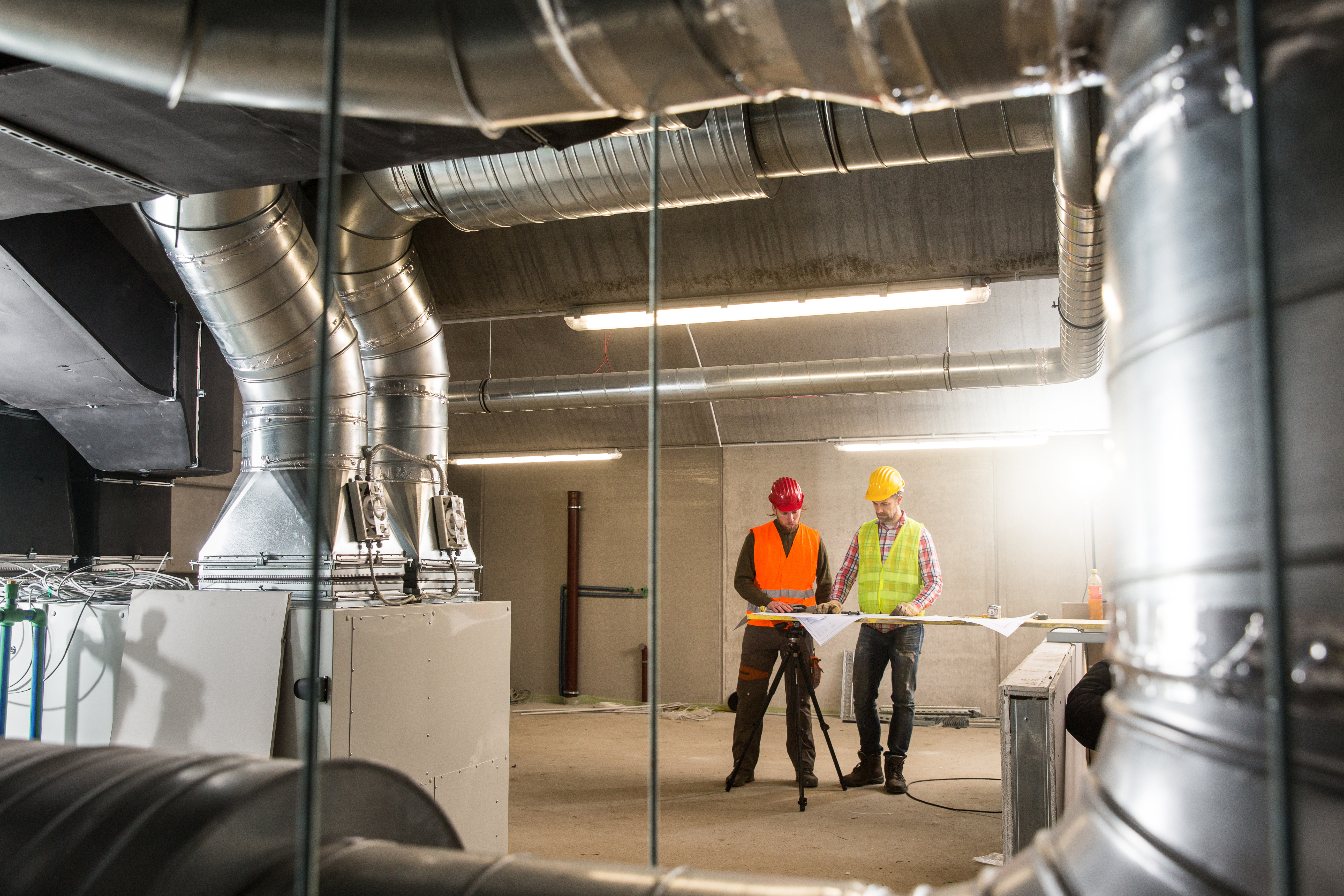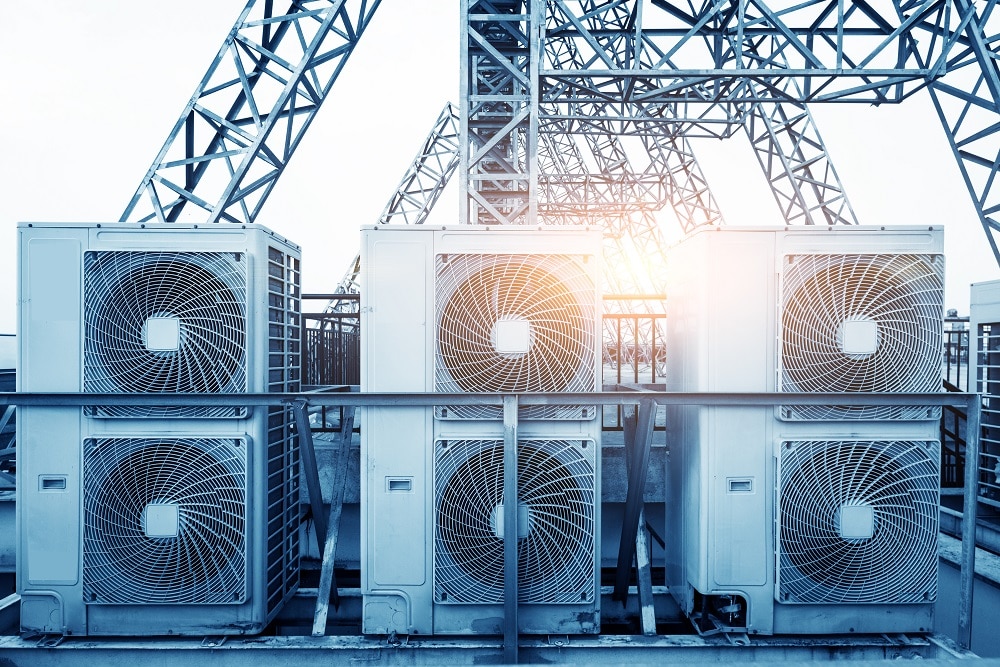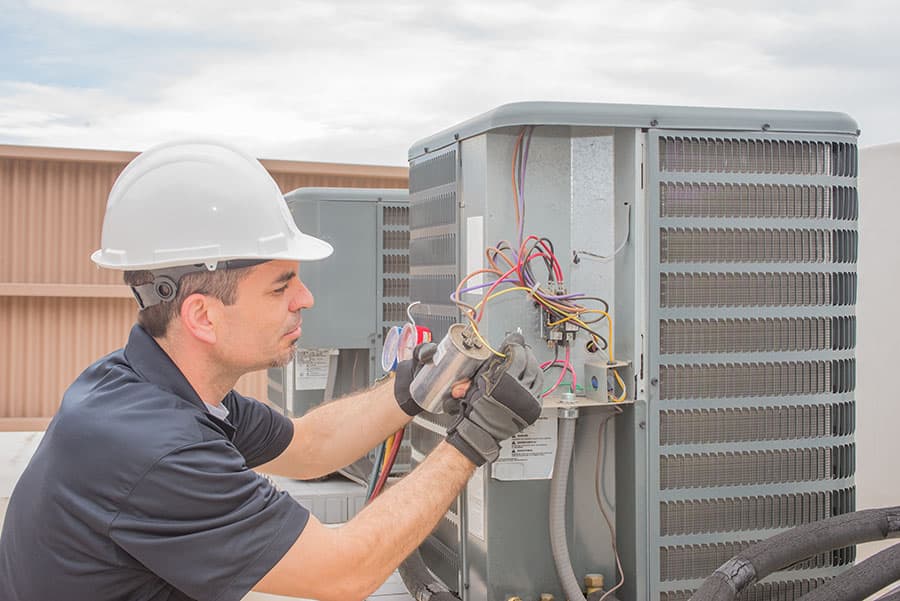Learn why so many homeowners rely on HVAC experts for efficient cooling and heating
Exploring the Necessary Parts of an Effective A/c System
An effective heating and cooling system is constructed on a number of important parts that work in harmony. Each component, from the thermostat to the ductwork, plays a crucial duty in preserving convenience and energy effectiveness. Understanding these elements is vital for optimizing efficiency and improving indoor air top quality. As one checks out these elements, the elaborate relationships in between them reveal understandings right into improving total system effectiveness. What certain factors add most to this efficiency?
The Role of the Thermostat in A/c Performance

Commonly neglected, the thermostat plays an important role in the efficiency of A/c systems. This little gadget works as the key control center, managing temperature settings and making certain excellent comfort within an area. By properly noticing the ambient temperature, the thermostat interacts with the home heating, air, and air flow conditioning devices to keep the preferred environment
An effective thermostat lessens power usage by activating the heating and cooling system only when necessary, thereby preventing extreme heating or air conditioning. Modern programmable and clever thermostats enhance this effectiveness additionally by allowing customers to set timetables and from another location change setups, adjusting to day-to-day regimens.
In addition, the placement of the thermostat is vital; improper location can result in imprecise temperature level readings, resulting in inefficient operation. Generally, a well-functioning thermostat not just enhances comfort however likewise adds markedly to energy financial savings and the long life of the cooling and heating system.
Comprehending the Importance of Air Filters
Air filters serve an essential feature in heating and cooling systems by guaranteeing that the air distributing within an area remains tidy and healthy and balanced. These filters catch dirt, irritants, and other toxins, preventing them from being recirculated throughout the setting. By catching these bits, air filters add to improved interior air quality, which can greatly profit owners' wellness, specifically those with allergies or respiratory system problems.
Furthermore, maintaining clean air filters boosts the efficiency of heating and cooling systems. Clogged filters can limit air flow, causing the system to work more challenging to maintain wanted temperatures, resulting in boosted energy consumption and greater energy costs. Frequently replacing or cleaning filters is a crucial upkeep action that can extend the life expectancy of a/c equipment. Inevitably, recognizing the importance of air filters allows homeowners and building supervisors to take aggressive procedures to ensure a well-functioning, effective a/c system that advertises a comfy and risk-free interior atmosphere.

The Performance of the Heater and Heatpump
Heating systems and warm pumps are crucial parts of HVAC systems, in charge of offering heat during cooler months. Furnaces operate by heating air with combustion or electric resistance, then distributing it throughout the home through air ducts. They generally supply fast home heating and can be sustained by all-natural gas, electrical energy, or oil, relying on the system type.
On the other hand, heatpump move warm rather than generate it. They remove warmth from the outdoors air or ground, also in low temperatures, and transfer it inside. HVAC experts. This double capability enables heatpump to also give cooling in warmer months, making them flexible alternatives for year-round environment control
Both systems call for appropriate upkeep to guarantee effectiveness and longevity. While furnaces stand out in severe cool, heatpump can be beneficial in modest climates. Recognizing their unique functionalities help homeowners in selecting one of the most ideal option for their home heating needs.
Checking Out the Cooling Unit
The a/c system is a vital element of cooling and heating systems, offered in different kinds to fit various needs. Comprehending the performance ratings of these units is essential for making informed choices concerning power intake and price. get more This section will check out the diverse sorts of a/c and clear up exactly how efficiency rankings impact efficiency.
Kinds Of Air Conditioners
While various aspects affect the option of cooling systems, comprehending the various types readily available is critical for homeowners and structure supervisors alike. Central air conditioning conditioners are made to cool entire homes or structures, utilizing a network of ducts for air movement. Home window systems use an even more local service, ideal for little spaces or single areas. Mobile ac unit give versatility, permitting users to relocate the unit as required. Ductless mini-split systems are one more choice, integrating the effectiveness of main systems with the comfort of zoning, as they call for no ductwork. Ultimately, geothermal systems harness the earth's temperature for energy-efficient cooling. Each kind comes with distinctive advantages, making educated choices important for efficient climate control.

Efficiency Rankings Described
Comprehending effectiveness ratings is essential for picking the best air conditioning device, as these metrics give insight into the system's performance and energy consumption. The most common rating for air conditioning unit is the Seasonal Power Effectiveness Ratio (SEER), which measures the cooling result during a common air conditioning season separated by the overall electric energy input. A higher SEER shows far better effectiveness. In addition, the Power Efficiency Proportion (EER) is used for gauging efficiency under certain problems. An additional crucial metric is the Energy Star qualification, which indicates that a device fulfills stringent power performance standards. By reviewing these ratings, customers can make educated choices that not just maximize comfort yet additionally lower energy costs and ecological impact.
The Significance of Ductwork and Air flow
Effective ductwork style and air movement administration play crucial duties in the general efficiency and performance of HVAC systems. Proper ductwork guarantees that conditioned air is dispersed HVAC experts equally throughout a space, reducing temperature variations and improving comfort. Properly designed air ducts decrease resistance to air flow, lowering the work on heating and cooling devices and eventually lowering power consumption.
Airflow management includes purposefully putting vents and registers to enhance the circulation of air. This protects against common concerns such as warm or cool places, which can take place when airflow is blocked or inadequately balanced. In addition, the ideal duct materials and insulation can better enhance efficiency by reducing heat loss or gain throughout air transit.
An efficient ductwork system not only adds to energy financial savings but can also prolong the life-span of HVAC equipment by reducing unneeded pressure (HVAC experts). As a result, understanding the importance of ductwork and airflow is necessary for accomplishing peak a/c system performance
Normal Maintenance Practices to Enhance Performance
Regular upkeep methods are important for ensuring peak performance of HVAC systems. These techniques consist of routine assessments, cleaning, and necessary repair services to keep the system running successfully. Routinely transforming air filters is important, as clogged up filters can obstruct airflow and lower efficiency. On top of that, specialists must check and clean evaporator and condenser coils to stop overheating and power wastage.
Annual specialist assessments are likewise recommended, as skilled specialists can recognize potential problems prior to they rise. Oiling relocating parts minimizes wear and tear, adding to a much longer life-span for the system. Additionally, making sure that the thermostat functions properly help in keeping optimal temperature control.

Frequently Asked Questions
Exactly how Usually Should I Replace My Thermostat?
Thermostats must typically be changed every 5 to 10 years, depending upon use and modern technology advancements. Normal checks are advisable to ensure peak efficiency, specifically if experiencing inconsistent temperature level control or increased energy expenses.
What Dimension Air Filter Is Ideal for My Heating And Cooling System?
The finest dimension air filter for an a/c system differs by device design. Generally, it's vital to consult the owner's guidebook or examine the existing filter measurements to ensure peak performance and air top quality.
Can I Install a Warm Pump Myself?
Installing a heatpump independently is possible for knowledgeable individuals, yet it calls for expertise of regional codes and electric systems. Hiring an expert is recommended to guarantee correct installment and ideal system efficiency.
Just how Do I Know if My Ductwork Is Reliable?
To figure out ductwork effectiveness, one should look for leakages, step airflow at vents, check insulation quality, and examine temperature differences in between supply and return ducts. Specialist assessments can give extensive understandings right into overall performance.
What Are Signs My Heating And Cooling Demands Immediate Maintenance?
Signs that an a/c system needs instant maintenance include uncommon sounds, irregular temperatures, increased power bills, undesirable odors, and regular cycling. Resolving these issues without delay can prevent more damage and warranty top system efficiency.
Air filters serve a vital feature in Heating and cooling systems by ensuring that the air distributing within a room continues to be healthy and balanced and clean. In addition, keeping tidy air filters enhances the effectiveness of Heating and cooling systems. Ductless mini-split systems are an additional choice, combining the performance of central systems with the ease of zoning, as they need no ductwork. Understanding effectiveness rankings is necessary for selecting the best air conditioning unit, as these metrics offer understanding into the system's performance and energy intake. The best size air filter for a Cooling and heating more system varies by device design.